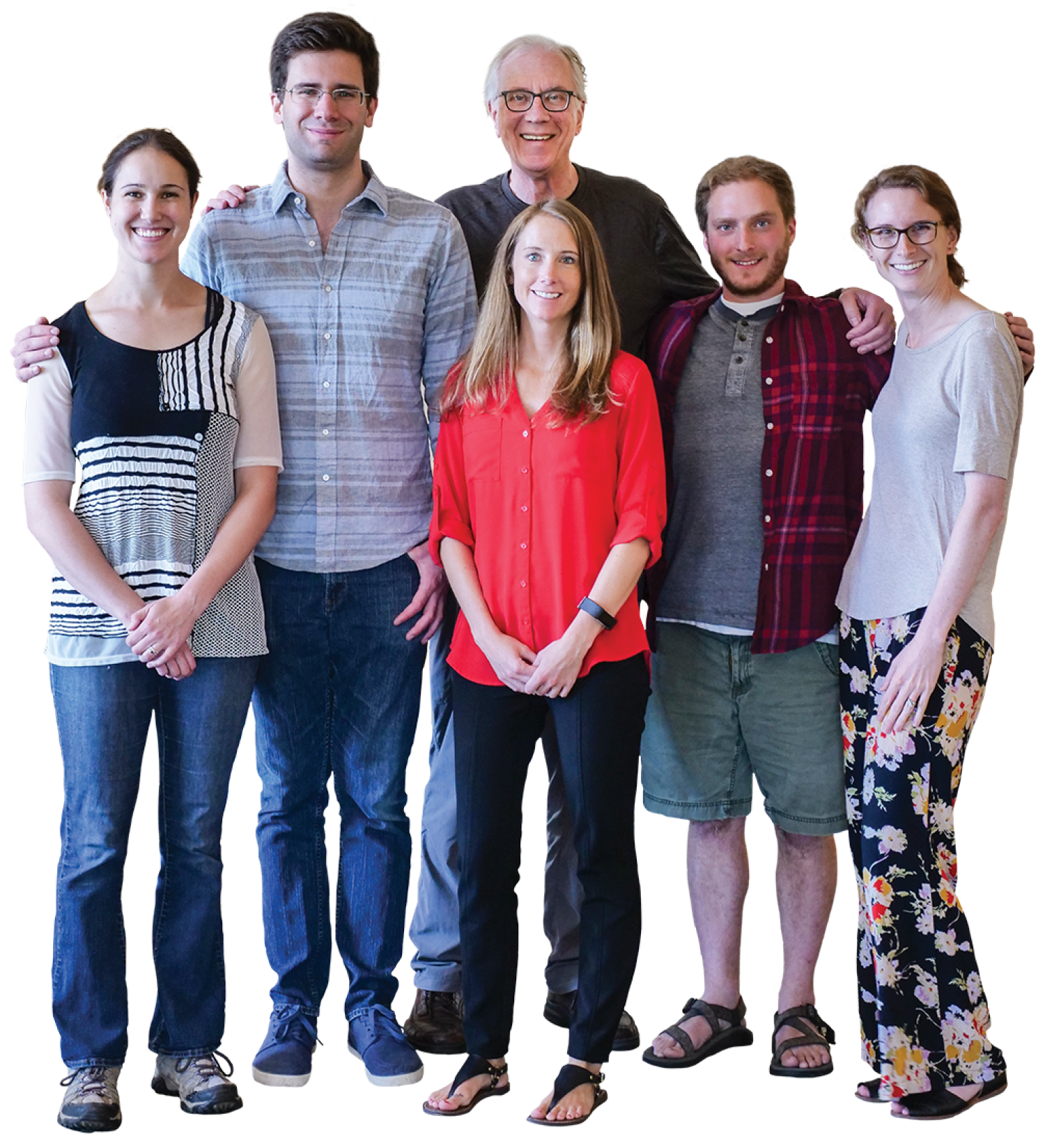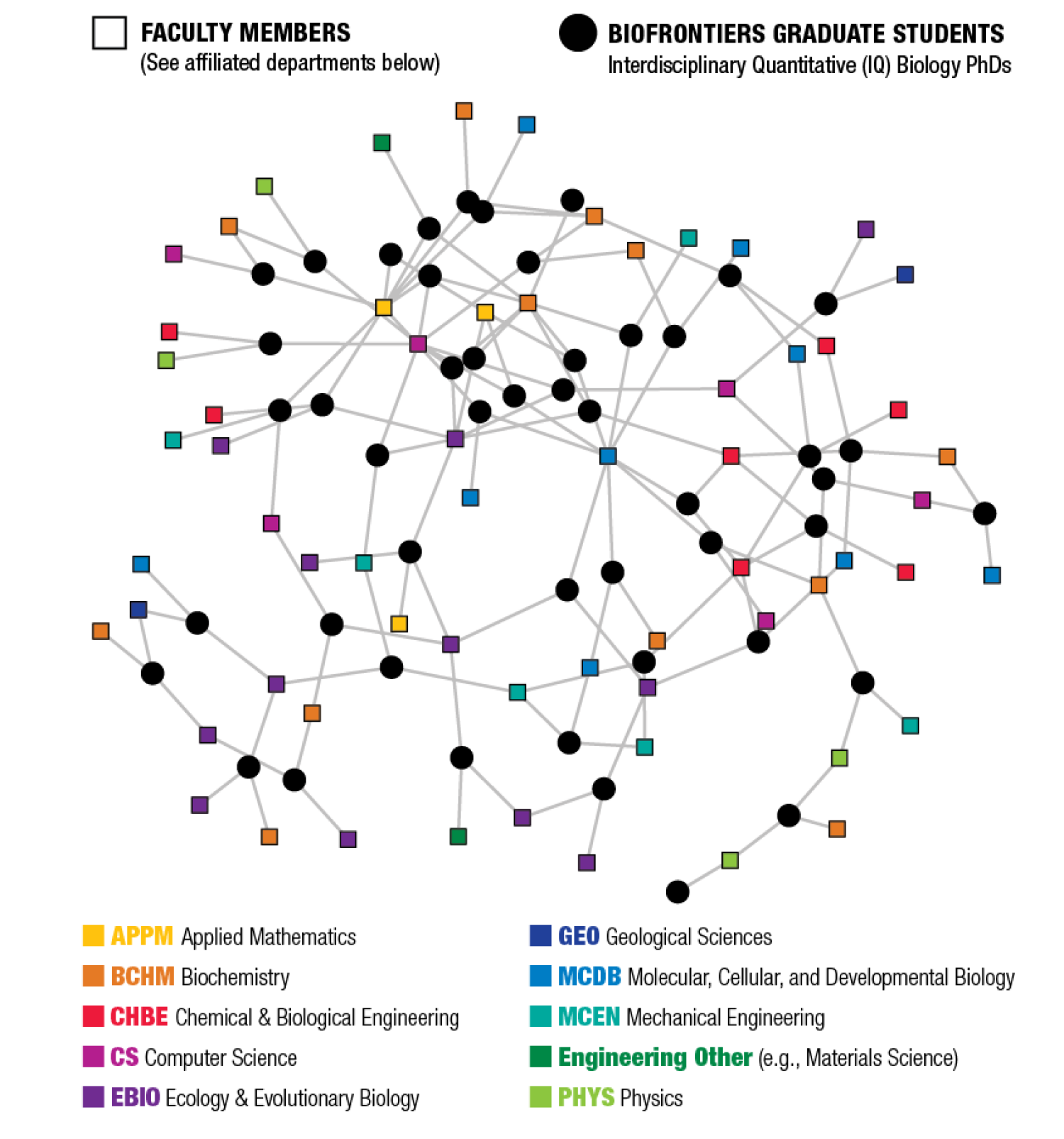Securing The Future of Bioscience
Despite the widespread popularity of “interdisciplinarity” (a major buzz-word in current bioscience research), few programs deliver on its promise. BioFrontiers’ Interdisciplinary Quantative Biology PhD Certificate Program (IQ Biology) is a rare breed, designed from the ground up to break down academic silos, and foster cross-disciplinary collaboration. This unique program trains the next generation of innovation leaders, laying the foundation for tomorrow’s bioscience advances.

To secure the future of the program, BioFrontiers advisory board members Chris Christoffersen, Ken Hitchner, Jim Linfield, and Jeannie Thompson, along with their families, joined together to fund the Cech-Leinwand Endowed Graduate Fellowship. This diverse group of scientists, entrepreneurs, investors, and legal experts are longtime supporters of BioFrontiers’ vision, and they continue to bolster its strength. “The IQ Biology program is an invaluable and indispensable driver of medical breakthroughs benefiting human health. This program is of tremendous value to the University, students, and faculty who are a part of it,” says Jeannie.
Launching a Forward-Thinking Graduate Program
The IQ Biology Program was originally launched by a National Science Foundation Integrative Graduate Education and Research Traineeship (IGERT) grant, which provided $3 million over five years. With this funding, Tom Cech, Leslie Leinwand, and BioFrontiers’ faculty built a forward-thinking training program. Sustaining and growing the IQ Biology Program requires extensive fundraising efforts. Chris explains, “Programs must be endowed to become independent of the vagaries of politics, etc.”
BioFrontiers aims to raise support for ten endowed fellowships for incoming students. These fellowships are essential for attracting top-notch talent and providing the resources to explore scientific frontiers without limitations. This freedom of exploration is a cornerstone of BioFrontiers’ success in innovation.
In 2016, the first fellowship was established with a $1 million gift from John Milligan and his wife, Kathryn Bradford-Milligan, in honor of John’s PhD mentor, Dr. Olke Uhlenbeck. Following suit in 2017, CU alumnus and advisory board member Evan Jones funded a two-year fellowship to begin that fall. Evan explains, “Contributing to an IQ Biology Fellowship is an extraordinary opportunity to affect the lives of emerging professionals. In the future, these students will become key leaders in the life sciences. We are launching the next generation of scientists to catapult us into the future.” With the Cech-Leinwand Fellowship, the advisory board hopes to further inspire others to support the cause.
The new fellowship honors Tom and Leslie for their pioneering vision and distinctive brand of leadership. “They have created a unique environment and culture of collaboration, which is really hard to do. It’s been in the fabric of BioFrontiers since the very beginning, and that’s a testament to their leadership, values, and personalities,” says Jim.
Training Tomorrow’s Bioscience Leaders
For students aiming to forge new frontiers in bioscience, the IQ Biology program is the perfect launching pad, says Jeannie. The unique interdisciplinary training will set IQ Biology graduates up for success. “Whereas most graduate programs silo emerging scientists, stifling their creativity and training them for a very narrowly focused career, the IQ Biology Program is a very unique model that gives students the freedom and breadth to tackle big ideas and big problems during their training and throughout their careers,” says Evan. With this foundation, Jim notes, “IQ Biology graduates will rise to leadership positions in both academia and industry thanks to their breadth of skills.” IQ Biology alumni build biotech companies, become professors, and receive prestigious postdoctoral fellowships in varied research areas.
In academic realms, their skills in bridging diverse disciplines will provide the insight to solve today’s greatest medical challenges. “Their knowledge of other fields and how they interact will lead them to innovative paths that others can’t see,” says Chris. Jim adds, “It’s rare to find a solution to a complex problem within a single discipline.” Trained to harness the power of computational sciences to assess biological systems, they will make breakthroughs against leading killers like cancer, and cardiovascular and infectious diseases. “Basic research here touches the most significant health concerns of today, with the potential to help hundreds of millions of people worldwide,” says Jim.
IQ Biology students are also well prepared for diverse aspects of translational science. With mentors like Tom Cech, Leslie Leinwand, and many others on the BioFrontiers team, students learn from the best how to turn discoveries into impactful commercial ventures. “Ultimately to make a difference to people’s health, you have to develop a product and take it to market,” says Jim. Exposing students to industry operations and opportunities early on trains them to think big picture, and develop translational skills. “Those with interdisciplinary training rise to industry leadership because they see a broader picture. Their interest and knowledge of a wide range of topics, including clinical trial design, patent law, and finance, is extremely valuable for effective senior management,” says Jim.
By ingraining interdisciplinary thinking and skills to traverse public and private sectors early, IQ Biology is educating a new breed of scientists with translational muscle. “BioFrontiers understands the need to integrate education with commercial development in order to optimize medical progress,” says Ken. “It’s a hothouse for generating the type of science and scientists who will fertilize medical advances that will revolutionize the way we live.” Ken, Jim, Jeannie, and Chris all agree the program has pioneered a unique and essential niche in training that yields not only groundbreaking medical advances but seeds the future of bioscience research. “These students will invent the next set of revolutionary techniques and tools that will drive bioscience forward,” says Chris.
IQ Biology Academic Collaborations
The IQ Biology PhD Certificate Program att

This visualization depicts the academic collaborations between IQ Biology PhD students and the faculty from their affiliated academic departments.

